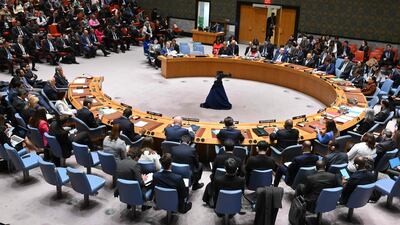There is little doubt that Israel’s response to the October 7 attack by Hamas has left it diplomatically isolated. Until now, the country’s leadership could afford to discount this to an extent, given the considerable political cover granted to it by the US, its main ally. That calculus has shifted significantly.
Washington’s abstention in Monday’s vote to approve UN Security Council Resolution 2728 – a call for an “immediate ceasefire for the month of Ramadan respected by all parties” – may prove to be a turning point in the strained relationship between US President Joe Biden and Israeli Prime Minister Benjamin Netanyahu. The White House has stepped aside to allow a global call for a Gaza ceasefire – albeit a limited one – to pass.
Abruptly shorn of American backing at the UN, Israel’s leadership is now confronted by a legally binding ceasefire call that has the support of UN Secretary General Antonio Guterres, the Arab League and the EU. Despite the frequent criticisms made of the UN Security Council, its latest resolution is a demonstration of collective global responsibility, and one that Israel dismisses at its peril.

Although the resolution is welcome, caveats remain, and many wonder why it has taken nearly six months of death and destruction to finally arrive at such a proposal. Sadly, the fact is this war has continued largely because Israel's primary political and military supporter enabled it to weather the storm of international condemnation. Nevertheless, it is precisely this relationship that will be so important in determining what happens next.
Many of the policies pursued by Mr Netanyahu thus far are becoming increasingly unacceptable to this US administration – and to many American voters. These include threats to attack the overcrowded city of Rafah, frustrating international aid efforts to the extent that countries are forced to use aid drops and pursuing settlement building on occupied Palestinian land, even during wartime. At the beginning of March, the White House also hosted Benny Gantz for talks. Mr Gantz is a member of Israel’s war cabinet, but he is also a fierce critic and political rival of Mr Netanyahu.
Mr Netanyahu has made clear his displeasure at the Security Council resolution. However, despite the cancellation of a planned visit by a high-level Israeli delegation to Washington, there is no reason to believe that communication with the US will break down. The security and military relationship between the two countries runs too deep, even if the political relationship is under severe pressure; a meeting between US Defence Secretary Lloyd Austin and his Israeli counterpart, Yoav Gallant, took place yesterday.
But a message has been delivered and it is this: business as usual in the US-Israel relationship is no longer an option. Mr Biden faces public, party and international pressure over Gaza in an election year. The current US administration will also be alert to any Israeli attempt to run down the clock to November’s presidential election, in the hope that a return of Donald Trump will restore the uncritical support Israel enjoyed during his time in office.
What matters most however is the situation in Gaza. Passing the ceasefire resolution is one thing, enforcing it is another, and Israel has ignored many such UN calls in the past. At least 17 people were killed in Israeli air strikes on Rafah just hours after the resolution was passed, Israeli forces continue to carry out deadly raids on non-functioning Gaza hospitals and the threat of famine looms over the enclave. As Palestinian civilians continue to suffer terribly, the fate of about 100 Israeli hostages in the hands of various militant groups hangs in the balance.
Earlier this week, this newspaper asked if the tide was turning on the Gaza war. Although a ceasefire cannot come quickly enough, it may just be that an important Rubicon has been crossed with this UN resolution. Washington remains Israel’s main partner, and it is up to the US to ensure its ally hears the global call that has been made.


